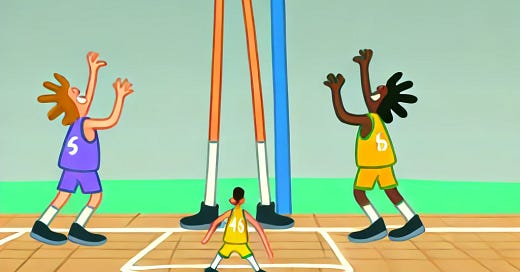Olympic tidbits: Talent isn't everything
The US Olympic men's basketball team is loaded with the top NBA stars, but we also have a 3x3 basketball team at the Games with much less heralded players who decided to specialize in the smaller version. They're also struggling, raising calls to put NBA or top college players on the team next time. (The rules limit how much you could do that, but you could do it a little bit.) It'll be cool if that happens, but I think it's foolish to assume that we'd dominate just by dropping in more talented players -- the small differences in the 3x3 game could mean a lot.
Don't believe me? Look at last week's doubles tennis event. Spain's Carlos Alcaraz (arguably the best player in the world right now) partnered with Rafael Nadal (inarguably the best clay-court player of all-time) to form one of the most talented doubles teams ever. But doubles play is a little different than singles, and after winning a couple matches, they lost in straight sets to a pair of US players who never ranked in the top 50 as singles players but reached #1 in doubles.
Likewise, dropping the best random basketball players into 3x3 competition with a couple weeks of practice would be extremely fun, but I don't think it would be the cakewalk people are expecting. (If we convinced NBA-level players to specialize in 3x3 for a while instead, that would be a different story, but that's not happening.)
**
I try not to hate on all the weird new Olympic events, because most of the old events are also weird. But it's a little hard to take the skateboarding seriously, especially the women's events, because all of the winners are 15 years old, and can 15-year-olds really be the best in the world at anything meaningful?
The best argument I've seen is that there is one thing 15-year-olds are actually the best at and helps a lot for skateboarding: not caring if you hurt yourself. Still, if that was all that it took, I'd expect 15-year-olds to dominate the trampoline and maybe a few other events.
**
The US set a world record in the 4x100 mixed medley relay, avenging a fifth-place finish in Tokyo that was caused by one of the worst math mistakes I’ve ever seen in sports.
Two factors play important roles in a mixed medley relay: 1) the best men swim about 10% faster than the best women, and 2) the freestyle is much faster than the butterfly and backstroke, which in turn are much faster than the breaststroke. This means the absolute gap is largest in the slowest event: the men’s world record in the breaststroke is 7.5 seconds faster than the women’s, compared to a gap of only five seconds in the freestyle. So if you have a reasonably deep bench of swimmers, it’s much faster to have a man swim the breaststroke and a woman swim the freestyle than the reverse. (The butterfly and backstroke are pretty close in speed, and you need two men and two women, so the choice there isn’t so clear.)
Tokyo was the first time this event was held, and the US somehow didn’t realize this, sending out its world-champion women’s breaststroker and men’s freestyler; they lost seven seconds on the field in the former and made up only five in the latter, the difference between silver and fifth place. This time, they arranged their lineup optimally—as every other team did in 2020 and 2024—and they won.
It is sort of silly to have a medley relay where math dictates what the men or women should swim; the mixed freestyle relay is much more fun, and if they want to do more of it I’d just add an all-butterfly or all-breaststroke mixed relay.
**
If you disagreed with my hot take that the freestyle is the only good swimming event, I hope you enjoyed watching the 200 IM last night, when American Alex Walsh lost a bronze medal by being disqualified for turning over a fraction of a second too early. It was a correct call, but it also sucked to watch (and probably to compete in).
**
More fun things I've seen or learned:
I'm hardly the first to say it but Peacock's Gold Zone coverage has been terrific -- it's pretty much all I watch during the day now, giving good exposure across all sports and checking in at the most exciting times.
If you needed another reason to hate racewalking, it started as a way for nobles to bet on which of their footservants walked the fastest.
Every toddler’s dream: studying dinosaurs and winning gold for trampolining.
And filming the trampoline is mesmerizing.
The lifecycle of 1990s rappers continues to be weird.
Don't miss the Italian parmesan gymnast or the Norwegian muffin fiend.
"Wacky inflatable arm guys" have been around for less than three decades; they were invented for the Atlanta Olympics in 1996.


